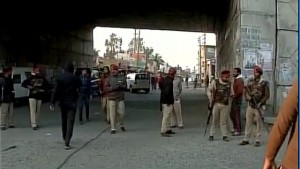Even as speculation continues about the precise identity of the perpetrators of the Pathankot terror attacks, a former US official and strategic expert has singled out Pakistan’s spy agency ISI to be the mastermind of the airbase assault.
Pakistan’s Inter-Services Intelligence (ISI) is behind the attack on Pathankot air base in Punjab using a terrorist group it created 15 years ago, Bruce Riedel has said it in an article in The Daily Beast. He said the attack was designed to prevent any detente between India and Pakistan.
Having worked in the National Security Council of the White House, Mr Riedel was among the chosen few present at the Bill Clinton-Nawaz Sharif meeting in 1999 during the Kargil war.
In the article, Mr Riedel has analysed in detail the role of the ISI in the attacks in Pathankot and on the Indian Consulate in Mazar-i-Sharif in northern Afghanistan and argued that these attacks were the handiwork of Pakistan-based terror group Jaish-e-Mohammad (JeM), which the ISI created 15 years ago. “The ISI is under the generals’ command and is composed of army officers, so the spies are controlled by the Pakistani army, which justifies its large budget and nuclear weapons program by citing the Indian menace”, Mr Riedel said.
India’s National Investigative Agency (NIA) chief Sharad Kumar has said that preliminary probe has revealed the involvement of Pakistani elements in the terror attacks, but did not specifically mention the ISI.
In an interview to India Writes Network, Wilson John, an expert on India’s neighbourhood policy and counter terrorism, said that “Jaish-e-Mohammed (JeM) can carry out the operations on its own as it has done in the past but it is difficult to believe that terrorists were able to infiltrate into India with heavy arms and ammunition without the Pakistan Rangers and Army knowing about it.”
“The JeM was created in January 2000 after the Kandahar hijacking. In fact, the hijacking itself was masterminded by the ISI to free Masood Azhar and his assistant Syed Omar Sheikh. Both of them were members of Harkat ul Ansar, a key terrorist group supported by Pakistan Army to cause terrorism in Kashmir. So the attack could well have been on the orders of the Army.”
The attacks come in the backdrop of Prime Minister Narendra Modi’s surprise visit to Lahore on Christmas Day to impart a fresh momentum to the decision to launch a comprehensive bilateral dialogue between the two countries. In a telephonic conversation with Mr Modi, Pakistan’s Prime Minister Nawaz Sharif assured his country’s support in probing the Pathankot attack. India is mulling options on whether to go ahead with the foreign secretary-level talks scheduled for January 14-15 in Islamabad. The National Security Advisers of the two countries are in touch and are said to be working hard to salvage the dialogue process, but even if the talks were to go ahead, the focus would be firmly on cross-border terror.
(Sridhar Ramaswamy contributed inputs for this article)
Author Profile
- India Writes Network (www.indiawrites.org) is an emerging think tank and a media-publishing company focused on international affairs & the India Story. Centre for Global India Insights is the research arm of India Writes Network. To subscribe to India and the World, write to editor@indiawrites.org. A venture of TGII Media Private Limited, a leading media, publishing and consultancy company, IWN has carved a niche for balanced and exhaustive reporting and analysis of international affairs. Eminent personalities, politicians, diplomats, authors, strategy gurus and news-makers have contributed to India Writes Network, as also “India and the World,” a magazine focused on global affairs.
Latest entries
 DiplomacyJanuary 5, 2026India walks diplomatic tightrope over US operation in Venezuela
DiplomacyJanuary 5, 2026India walks diplomatic tightrope over US operation in Venezuela India and the WorldNovember 26, 2025G20@20: Africa’s Moment – The Once and Future World Order
India and the WorldNovember 26, 2025G20@20: Africa’s Moment – The Once and Future World Order DiplomacyOctober 4, 2025UNGA Resolution 2758 Must Not Be Distorted, One-China Principle Brooks No Challenge
DiplomacyOctober 4, 2025UNGA Resolution 2758 Must Not Be Distorted, One-China Principle Brooks No Challenge India and the WorldJuly 26, 2025MPs, diplomats laud Operation Sindoor, call for national unity to combat Pakistan-sponsored terror
India and the WorldJuly 26, 2025MPs, diplomats laud Operation Sindoor, call for national unity to combat Pakistan-sponsored terror








